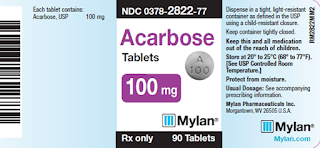Name: Acarbose
Group: Antidiabetes, alpha-glucosidase inhibitor
Trademarks: Precose
Available in tablet form: 25mg, 5mg, 100mg
Acarbose is an anti-diabetic drug used to treat type 2 diabetes mellitus, and in some countries, is used as a prediabetes drug.
Acarbose is used by combining the right diet and exercise program to control high blood sugar levels in type 2 diabetes mellitus.By controlling blood sugar levels, patients can avoid kidney damage, blindness, damage to the nervous system, and sexual dysfunction.Dosage and IndicationFor Type 2 Diabetes:
Initial dose: 25 mg orally taken every 8 hours when eating (first bite of food eaten, then medicine taken)
Doses may be raised to 50 or 100 mg orally every 8 hours at 4-8 weeks apart based on sugar values 1 hour after meals or hemoglobin glycosylate (HbA1c) levels, or oral glucose tolerance test values as recommended by physicianMaximum dose:
Patients weighing <60 kg: 50 mg every 8 hours
Patients weighing> 60 kg: 100 mg every 8 hoursUse:For type 2 diabetes mellitus, single therapy or combined with sulfonylurea treatment.Side effectsWith the occurrence frequency> 10%
Abdominal pain (19%)
Diarrhea (31%)
Increased serum transaminase
Fart (74%)Reports obtained after the drug is marketed:
Gastrointestinal: Fulminant hepatitis with fatal outcome, ileus / subileus (disturbance of the peristalsis of the small intestine), jaundice and / or hepatitis, and associated liver disorders
Skin hypersensitivity reactions: rash, erythema, exanthema, and urticaria
Edema
Thrombocytopenia
Pneumatosis cystoides intestinalisContraindications
Noted there is a history of hypersensitivity (allergy) to acarbosa
Diabetic ketoacidosis, cirrhosis, inflammatory bowel disease, colon ulceration, partial intestinal blockage or risk of partial blockage, impaired absorption in the gastrointestinal tractAlso Read: Autoimmune DiseaseWARNING
There is no clinical study of evidence of reduced macrovascular risk with acarbose or other antidiabetic drugs
Concurrent use with sulfonylureas or insulin is at risk of hypoglycemia; treat hypoglycemia with oral glucose (dextrose) and do not sucrosePregnancy and BreastfeedingSafety for pregnancy: Category B.Type of drug category for pregnancy:
Category A: Generally acceptable, has been studied in pregnant women, and shows no evidence of fetal damage
Category B: Probably acceptable by pregnant women, has been studied in experimental animals but there has been no direct research evidence in humans.
Category C: Use with caution. Research on animals try to show the risk and there has been no direct research on humans
Category D: Used if there is no other drug that can be used, and in a life-threatening condition.
Category X: Do not use in pregnancy.
Category NA: No informationNot recommended in breastfeeding mothers as there is no data on whether the drug is entering breast milk or not.
source: doktersehat.com
Group: Antidiabetes, alpha-glucosidase inhibitor
Trademarks: Precose
Available in tablet form: 25mg, 5mg, 100mg
Acarbose is an anti-diabetic drug used to treat type 2 diabetes mellitus, and in some countries, is used as a prediabetes drug.
Acarbose is used by combining the right diet and exercise program to control high blood sugar levels in type 2 diabetes mellitus.By controlling blood sugar levels, patients can avoid kidney damage, blindness, damage to the nervous system, and sexual dysfunction.Dosage and IndicationFor Type 2 Diabetes:
Initial dose: 25 mg orally taken every 8 hours when eating (first bite of food eaten, then medicine taken)
Doses may be raised to 50 or 100 mg orally every 8 hours at 4-8 weeks apart based on sugar values 1 hour after meals or hemoglobin glycosylate (HbA1c) levels, or oral glucose tolerance test values as recommended by physicianMaximum dose:
Patients weighing <60 kg: 50 mg every 8 hours
Patients weighing> 60 kg: 100 mg every 8 hoursUse:For type 2 diabetes mellitus, single therapy or combined with sulfonylurea treatment.Side effectsWith the occurrence frequency> 10%
Abdominal pain (19%)
Diarrhea (31%)
Increased serum transaminase
Fart (74%)Reports obtained after the drug is marketed:
Gastrointestinal: Fulminant hepatitis with fatal outcome, ileus / subileus (disturbance of the peristalsis of the small intestine), jaundice and / or hepatitis, and associated liver disorders
Skin hypersensitivity reactions: rash, erythema, exanthema, and urticaria
Edema
Thrombocytopenia
Pneumatosis cystoides intestinalisContraindications
Noted there is a history of hypersensitivity (allergy) to acarbosa
Diabetic ketoacidosis, cirrhosis, inflammatory bowel disease, colon ulceration, partial intestinal blockage or risk of partial blockage, impaired absorption in the gastrointestinal tractAlso Read: Autoimmune DiseaseWARNING
There is no clinical study of evidence of reduced macrovascular risk with acarbose or other antidiabetic drugs
Concurrent use with sulfonylureas or insulin is at risk of hypoglycemia; treat hypoglycemia with oral glucose (dextrose) and do not sucrosePregnancy and BreastfeedingSafety for pregnancy: Category B.Type of drug category for pregnancy:
Category A: Generally acceptable, has been studied in pregnant women, and shows no evidence of fetal damage
Category B: Probably acceptable by pregnant women, has been studied in experimental animals but there has been no direct research evidence in humans.
Category C: Use with caution. Research on animals try to show the risk and there has been no direct research on humans
Category D: Used if there is no other drug that can be used, and in a life-threatening condition.
Category X: Do not use in pregnancy.
Category NA: No informationNot recommended in breastfeeding mothers as there is no data on whether the drug is entering breast milk or not.
source: doktersehat.com
